Sikh Genocide 1984
Connecticut Sikhs Want US to Acknowledge “1984 Sikh Genocide” at Federal Level Like Armenian Genocide
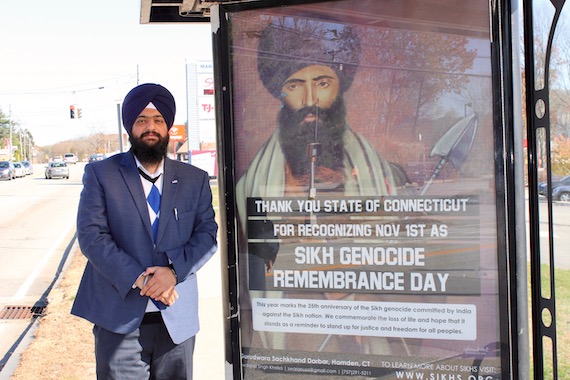
State of Connecticut took boldest decision by recognizing Sikh Genocide of 1984 by Indian Government. by passing legislation to commemorate November 1st as “Sikh Genocide Remembrance Day” every year and by allowing Sikhs to do annual event in State Capitol.

Commemorating 1984 Sikh Genocide Week Activists, Writers Held Memorial Meet at Chandigarh
Commemorating the 1984 Sikh Genocide week, the Dal Khalsa held a public meet to deliberate on what they called "politics of genocide being perpetuated by Indian mainstream parties against minorities since 1984".
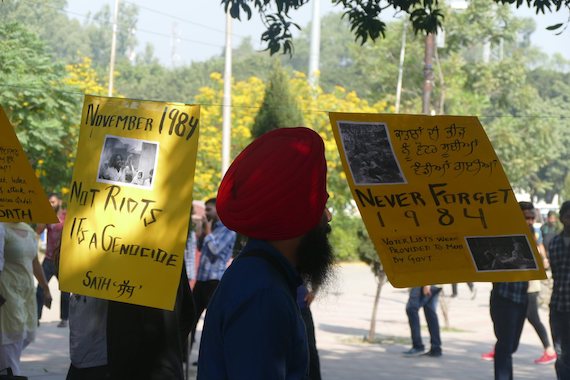
PICTORIAL: Exhibition Marked Memory of 1984 Sikh Genocide in Panjab University Chandigarh
Sath, a students' body, held an exhibition to mark the 35th anniversary of November 1984 Sikh Genocide. The exhibition was held from 9am to 5pm in the Student Centre at Panjab University, Chandigarh.
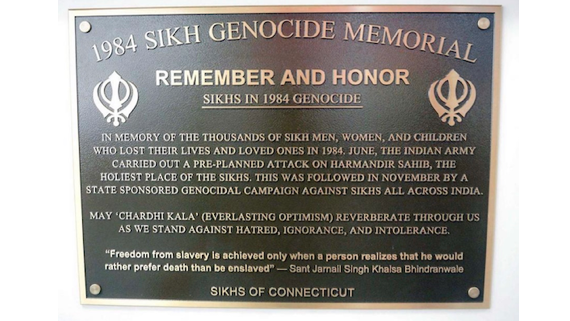
Getting Sikh Genocide Memorial Removed from US Library Exposes Indian State’s Denial Tactics
In his famous thesis regarding ‘stages of genocide’ US based scholar Gregory H. Stanton has identified ‘denial’ as last and unending stage of genocide. He says that every genocide is followed by denial. He further points out that denial tactics may be numerous.

Marking 35th Year of 1984 Sikh Genocide, Dal Khalsa to Hold Meet in Chandigarh on Nov 5
The Dal Khalsa with the active support of like-minded groups will hold convention on Nov 5 at Chandigarh to mark 35th year of 1984 Sikh genocide.

Sikh Genocide 1984: Injustice Continues – November 1984 to November 2019
In more than last three decades, on every anniversary of the 1984 massacre of Sikhs, this author has been reminding [that] how Indian State and judiciary did not bother to punish the perpetrators of this horrendous mass killing of the innocents of the second largest religious minority of [India].

USA’s First “1984 Sikh Genocide Memorial” to Come Up on June 1st 2019 in Norwich
Sikh Community of Connecticut along with City and State officials will be unveiling “1984 Sikh Genocide Memorial” which has been placed in Otis Library located at 261 Main St, Norwich CT 06360 on June 1st 2019 at 1:00pm.
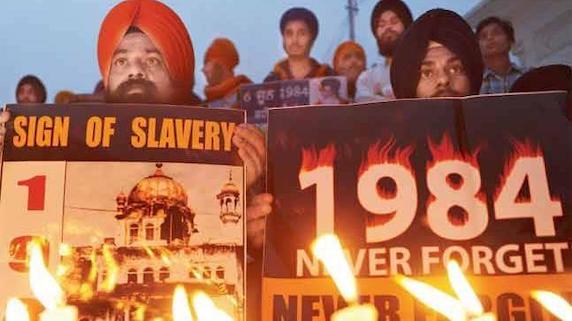
Congress and BJP-Badal Combine Playing Dirty Politics over 1984 Sikh Genocide for Votes
The Dal Khalsa yesterday hit out at Congress and BJP-SAD (Badal) for playing "dirty politics over the deaths during Nov 1984 Sikh genocide". The organization is of the view that both the mainstream parties of India have stains of innocent blood on their sleeves.

Tirlokpuri Massacre: Indian Supreme Court Sets Aside Conviction of 15 in 1984 Sikh Genocide Case
Indian Supreme Court today set aside conviction of 15 men held guilty of "rioting and arson" in a connection with genocidal massacre of Sikhs in East Delhi’s Trilokpuri in November 1984.
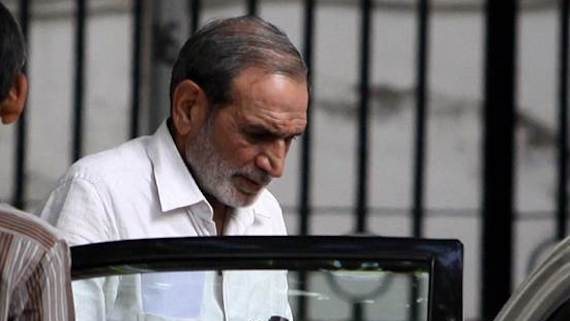
SCI Seeks Status of Sajjan Kumar Trial in 1984 Sikh Genocide Related Cases
The Supreme Court of India (SCI) on Monday (April 8) sought the status from Central Bureau of Investigation (CBI) on the ongoing trail of Sajjan Kumar in 1984 Sikh genocide related cases.

Indian Supreme Court Judge Recuses Himself in Sajjan Kumar Case
Indian Supreme Court judge Justice Sanjiv Khanna today recused himself from hearing Sikh genocide convict Sajjan Kumar’s appeal against his conviction and sentencing by the Delhi High Court.
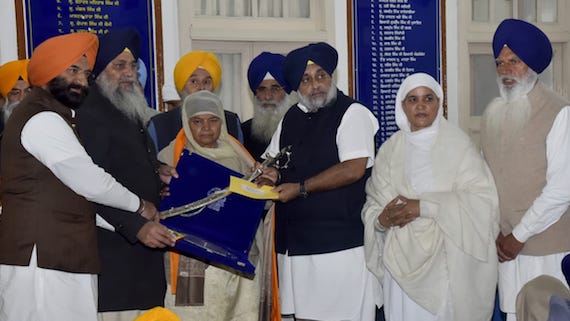
SGPC Honours Sikh Genocide Witnesses, Lawyers; Advo. Phoolka Sends Kin
SGPC on Saturday felicitated witnesses of 1984 Sikh genocide cases and the lawyers who fought the cases of the genocide to ensure conviction of Sajjan Kumar, at its headquarters, Teja Singh Samundari Hall, here in presence of the Shiromani Akali Dal (Badal) president Sukhbir Singh Badal.
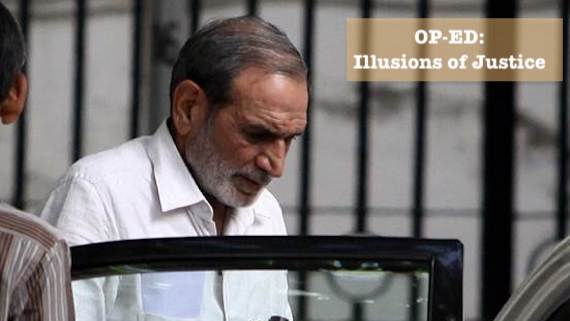
OP-ED: The Illusion of Justice
The recent life sentencing of Sajjan Kumar in a 1984 genocide case is being hailed as a landmark judgement by the Indian State’s various institutions vis-a-viz Media, Judiciary & Political parties.

Sajjan Kumar to be Kept Away from Sikh Inmates in Mandoli Jail
Sikh genocide 1984 convict Sajjan Kumar will be kept away from Sikh inmates in Mandoli Jail complex. The jail authorities say that it was a precautionary measure to prevent any possible attack on Indian politician who had led genocidal massacre of Sikhs in Delhi in November 1984.

1984 Sikh Genocide Convicts Sajjan Kumar, Mahinder Yadav and Krishan Khokhar Surrenders
Sikh Genocide 1984 convicts Sajjan Kumar, Mahinder Yadav and Krishan Khokhar surrendered before a Delhi court today.

SIT Want Public to Provide Information About 80 Cases of 1984 Sikh Genocide within “2 Weeks”
The Special Investigation Team (SIT) constituted under the order of Indian Supreme Court dated 4th December, 2018 in the matter of S. Gurlad Singh Kahlon Vs. Union of India & Ors. vide Writ Petition (Crl. No. 9/2016) has invited the attention of general public for seeking information in respect of 80 cases related to 1984 Sikh genocide.

1984 Sikh Genocide: Convicted Indian Politician Sajjan Kumar Likely to Surrender on December 31
As per media report convicted Indian politician Sajjan Kumar is expected to surrender before a Delhi court on December 31 to serve the life imprisonment awarded to him by Delhi High Court in a 1984 Sikh genocide related case.
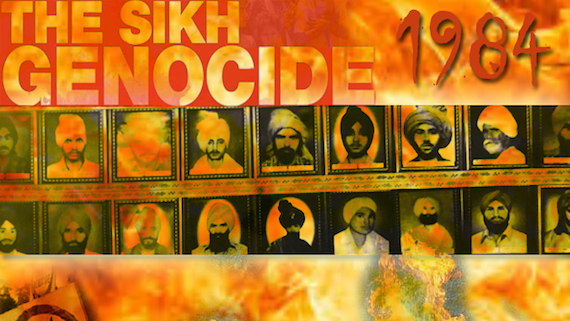
International Law Binds Indian State To Prevent, Punish Acts of Genocide [OP-ED]
What distinguishes the learned judgment delivered by Justices S Muralidhar and Vinod Goel is not just the meticulous finding of criminality and award of punishment in the Sajjan Kumar case but the urging that “Neither ‘crimes against humanity’ nor ‘genocide’ is part of our domestic law of crime.

Sajjan Kumar Moves Indian Supreme Court Against Conviction in 1984 Sikh Genocide Case
Convicted Indian politician Sajjan Kumar today (Dec. 22) moved the Supreme Court challenging his conviction in a case related to 1984 Sikh Genocide by the Delhi High Court.
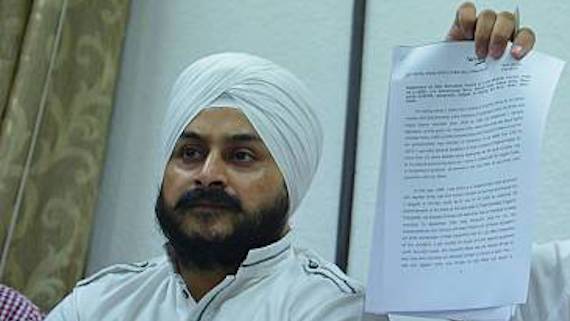
Delhi State Assembly Passes Resolution Condemning 1984 Sikh Genocide; Demands to Strip Rajiv Gandhi of Bharat Rattan Award
The state assembly of Delhi yesterday passed a resolution condemning the 1984 Sikh Genocide. The Sikh Siyasat News (SSN) was not able to secure a copy of the resolution till the time of writing this news but it is confirmed that the state assembly recognised the 1984 Sikh Genocide as 'genocide'.
« Previous Page — Next Page »








